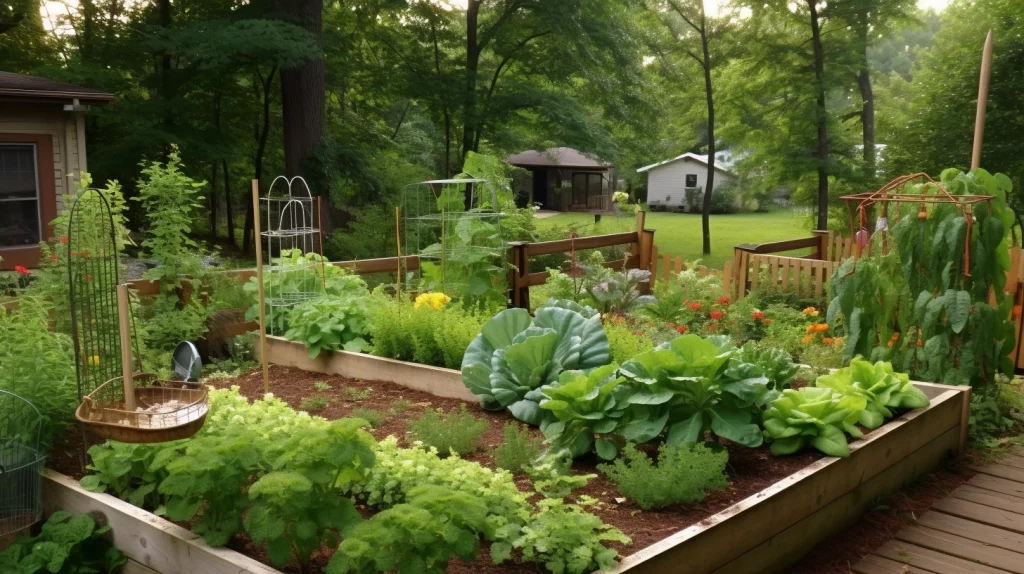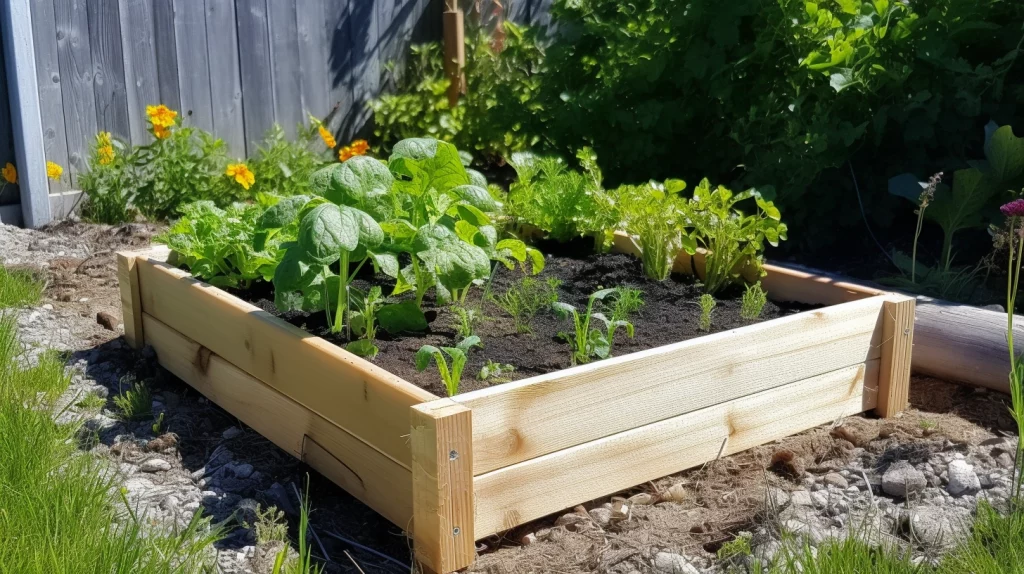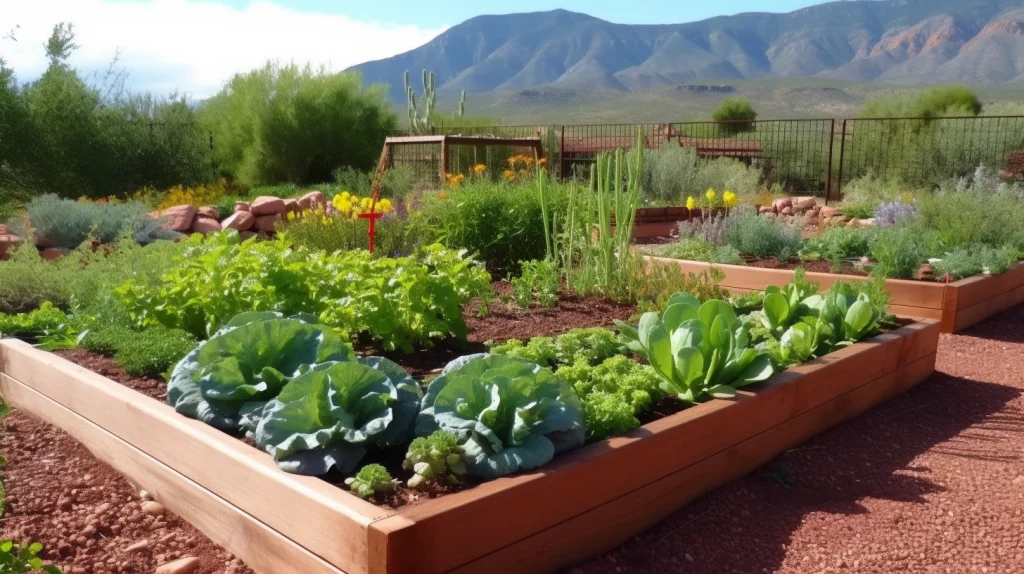
When it comes to gardening, the soil you use can make all the difference. This is especially true when considering soil for raised beds, where the soil needs to provide optimal conditions for plant growth. In this guide, we’ll delve into the art and science of preparing the perfect soil for raised beds, with a special focus on Oregon Super Soil.
Raised bed gardening is a method that involves growing plants in soil that is higher than the ground. Most people build raised beds with enclosed frames. One of the key benefits of raised beds is that they allow you to control the soil conditions more effectively. You can learn more about this in our Understanding Soil guide.
The Perfect Soil for Raised Beds: A Comprehensive Guide
When it comes to creating the perfect environment for your plants, the choice of soil for raised beds is paramount. The ideal soil should not only provide excellent drainage but also be nutrient-rich, have a slightly acidic to neutral pH, and possess a loose and friable texture that allows for easy root penetration. Additionally, it should be abundant in organic matter to retain moisture and nutrients, and foster the activity of beneficial microorganisms. Let’s delve deeper into each of these factors to understand why they are so crucial in the context of soil for raised beds.
Drainage: The Foundation of Healthy Plant Growth
One of the most important characteristics of good soil for raised beds is excellent drainage. Proper drainage ensures that excess water can easily escape, preventing conditions that lead to waterlogging. Waterlogged soil can be detrimental to plant roots, leading to root rot and other diseases. A balanced blend of sand, silt, and clay, often referred to as loamy soil, is typically ideal for ensuring excellent drainage. Loamy soil combines the best of all soil types, offering the perfect balance between water retention and drainage, making it an excellent choice as soil for raised beds.
Nutrient Content: The Fuel for Your Plants
The soil in your raised beds should be teeming with nutrients. These nutrients act as the fuel that powers plant growth, contributing to the health and productivity of your garden. Nutrient-rich soil can be achieved by adding compost or well-rotted manure, which are both excellent sources of essential plant nutrients. Some gardeners also choose to add specific soil amendments based on the needs of the plants they are growing. For instance, our Super Soil Starter Kit is a fantastic option for gardeners looking to enrich their soil with a balanced blend of nutrients. This kit is specifically designed to provide the optimal nutrient content for soil in raised beds, ensuring your plants have everything they need to thrive.
pH Level: Striking the Right Balance
The pH level of your soil can significantly impact plant health. Most vegetables prefer a slightly acidic to neutral pH, typically between 6.0 and 7.0. However, some plants may prefer more acidic or alkaline conditions. It’s important to adjust the pH of your soil to suit the specific plants you are growing in your raised beds. Testing your soil’s pH and making necessary adjustments ensures that your plants can effectively absorb the nutrients they need from the soil. This is a crucial aspect of preparing soil for raised beds.
Texture: The Key to Root Health
The texture of your soil plays a vital role in plant health. Ideal soil for raised beds should be loose and friable, making it easy for plant roots to penetrate and spread. Clay soils, while nutrient-rich, are heavy and can compact easily, making it difficult for roots to penetrate. On the other hand, sandy soils may not hold water well, leading to dry conditions. Loamy soil, which is a mix of sand, silt, and clay, often has the best texture for raised beds. It offers the perfect balance, providing a structure that supports root growth while retaining adequate moisture.
Organic Matter: The Lifeblood of Your Soil
Soil that is rich in organic matter helps to retain moisture and nutrients, and promotes the activity of beneficial microorganisms. These microorganisms contribute to the breakdown of organic matter into nutrients that plants can absorb. Adding compost or well-rotted manure can significantly increase the organic matter content of your soil. Our Root Enhancer is a fantastic addition to any soil mix, promoting robust root growth and overall plant health. It’s designed to work in harmony with the soil in your raised beds, providing a boost of organic matter that will help your plants thrive.
In conclusion, creating the
perfect soil for raised beds involves a careful balance of several factors. By ensuring excellent drainage, nutrient richness, appropriate pH levels, a loose and friable texture, and a high organic matter content, you can create an environment in which your plants will thrive. Each of these factors plays a crucial role in plant health and productivity, making them key considerations when preparing soil for raised beds.
Remember, the best gardeners are always learning and adapting. Don’t be afraid to experiment with different soil amendments and observe how your plants respond. Over time, you’ll develop a keen understanding of what works best in your garden. Happy gardening!


Preparing soil for raised beds involves several steps. First, you’ll need to measure your raised bed to determine how much soil you’ll need. Then, you’ll need to mix your soil ingredients together. This might include topsoil, compost, and other soil amendments. Our Soil Bags provide a convenient and high-quality soil solution for your raised beds. If you’re looking for larger quantities, check out our Bulk Soil options.
Different types of plants have different soil requirements. For instance, some plants may prefer more acidic or alkaline conditions, while others may require specific nutrients. It’s always a good idea to research the soil preferences of your plants and adjust your soil mix accordingly. Our Gardening Guides provide a wealth of information on various gardening topics, including soil preparation.
Raised bed gardening requires a specific type of soil that provides optimal conditions for plant growth. Here are some factors that make a good soil for raised beds:
Remember, the best soil for your raised bed may depend on the specific plants you are growing. It’s always a good idea to research the soil preferences of your plants and adjust your soil mix accordingly.
Oregon Super Soil is a fantastic choice for soil for raised beds. It’s a rich, organic soil that’s packed with nutrients and beneficial microorganisms. It also has excellent drainage and a loose, friable texture that’s perfect for raised beds. You can find out more about our soil and its benefits on our Oregon Super Soil page.
Based on the ingredients and nutrient breakdown you provided, Oregon Super Soil appears to be an excellent choice for raised bed gardening. Here’s a detailed analysis:
1. Soil Structure and Aeration:
2. Nutrient Content and Delivery:
3. Soil Health and Microorganism Activity:
4. Soil Amendment for pH and Toxin Control:
Oregon Super Soil contains a wide range of ingredients that contribute to soil structure, nutrient content, soil health, and pH control. These factors make it an excellent choice for raised bed gardening. However, it’s always important to consider the specific needs of the plants you’re growing, as different plants may have different soil requirements.
Our soil is also backed by rigorous testing. You can view the results and insights from our latest soil test report here. The best soil for raised beds may depend on the specific plants you are growing. It’s always a good idea to research the soil preferences of your plants and adjust your soil mix accordingly.” – Oregon Super Soil
If you’re in Arizona, we have several Arizona Locations where you can pick up our products.
In conclusion, choosing the right soil for your raised beds is a pivotal step towards a successful gardening experience. Oregon Super Soil offers a high-quality, nutrient-rich soil that’s perfect for raised beds. So why wait? Embark on your raised bed gardening journey with Oregon Super Soil today!
Remember, the best gardeners are always learning. For more tips and advice, continue exploring our Learn About Gardening section. Happy gardening!
For further reading and insights on raised bed gardening and soil selection, you may find these external resources helpful:
These resources provide a wealth of information that can further enhance your understanding and skills in raised bed gardening.


Super Soil Starter Kit Start your organic gardening journey with...
Unleash your farm's full potential with the 2-yard Super Sack...
7g Oregon Super Soil Root Enhancer Introduce your plants to...
28g Root Enhancer Oregon Super Soil Root Enhancer is your...
© 2023 All rights reserved
Oregon Super Soil